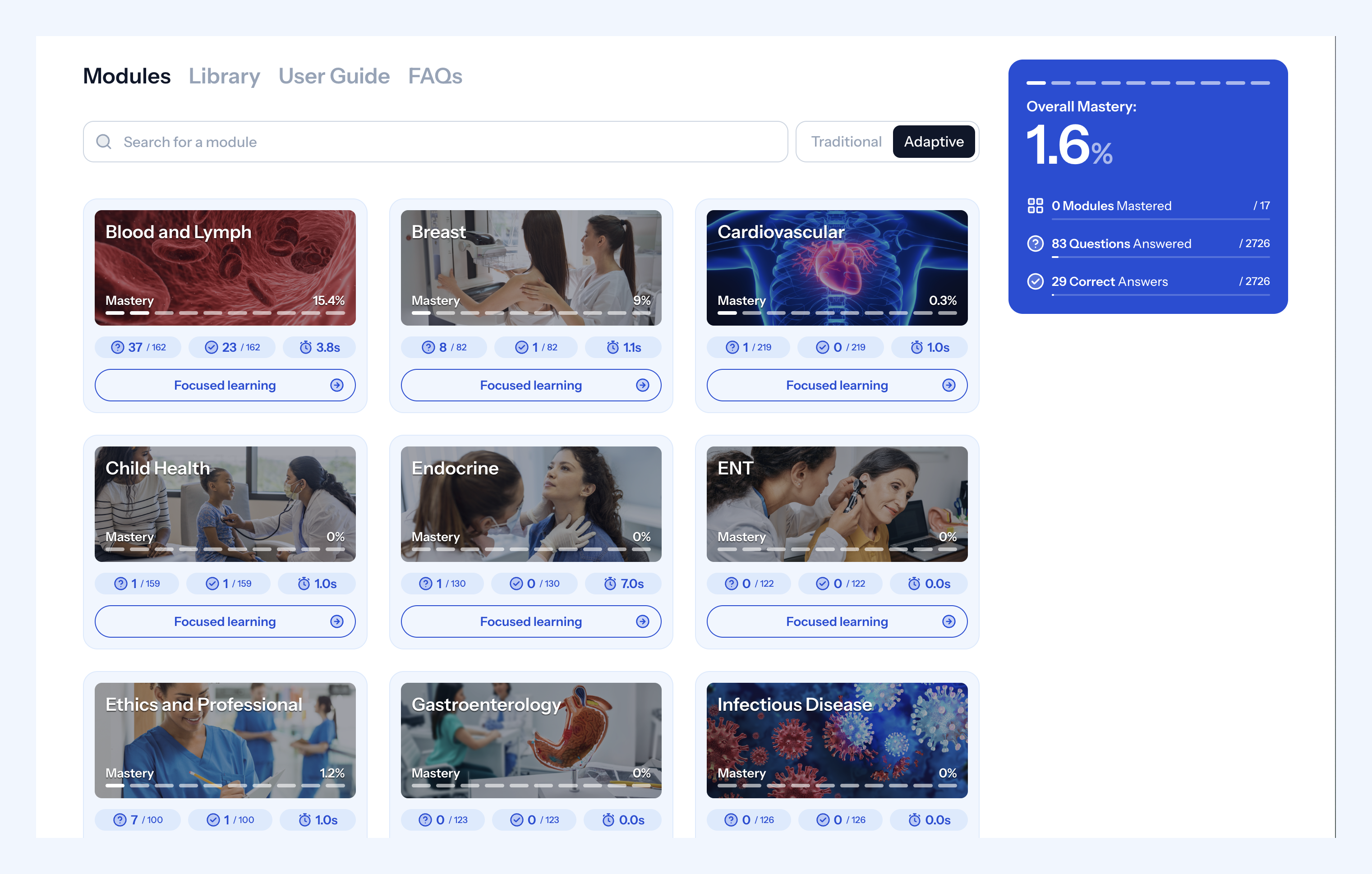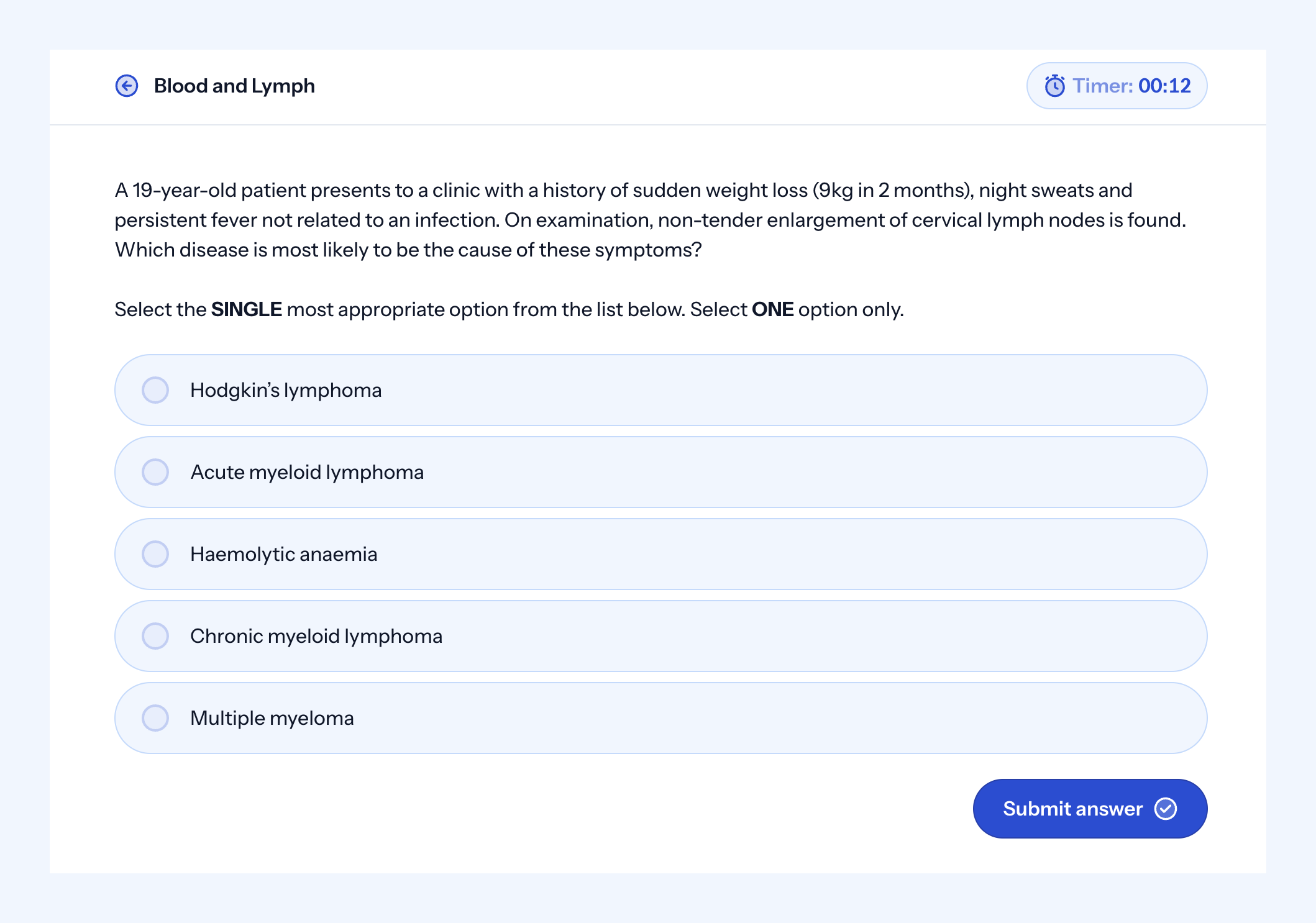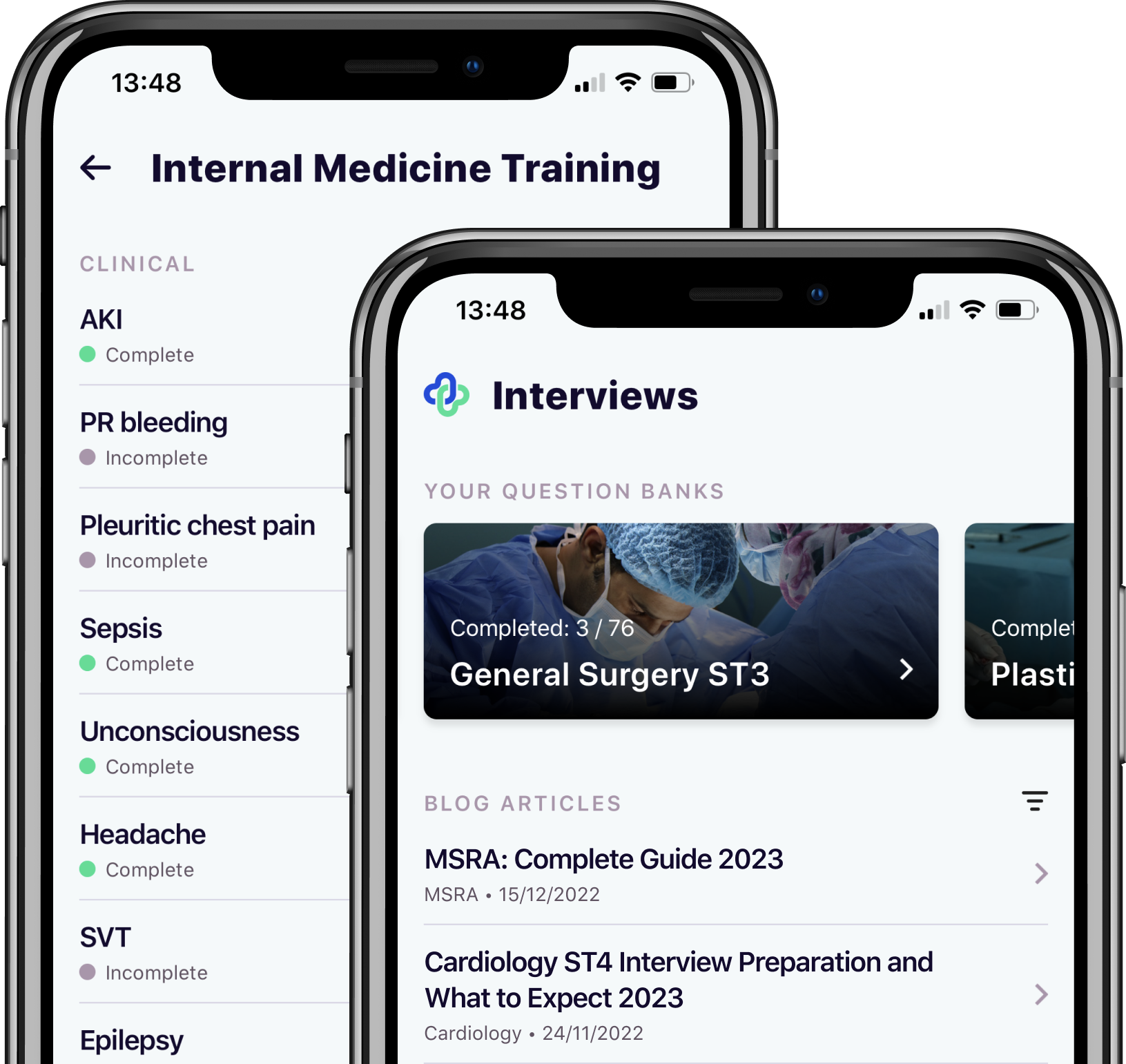
PLAB Pathway / Route
If you’re planning to undertake the Professional and Linguistic Assessments Board (PLAB) test in 2025, our PLAB pathway / route guide will provide you with key information about the process, from preparing and submitting your application through to receiving your exam results and what happens next.
Do you want to prepare for PLAB 1 using the most advanced question bank on the market?
Introducing the Medibuddy AI-powered PLAB 1 question bank, the only one on the market that uses artificial intelligence algorithms to deeply analyse your ability levels and create a personalised learning journey specifically tailored to boost your PLAB 1 score.
The PLAB is designed to assess that doctors who qualified outside of the UK have the relevant knowledge and skills to practise medicine within the UK. As part of the registration process with the General Medical Council (GMC) – compulsory for all doctors wishing to practise medicine within the UK – overseas medical graduates who don’t hold a relevant European qualification are required to complete the PLAB test.
The PLAB test involves a written multiple choice exam (Part 1 / PLAB 1) and a practical clinical exam (Part 2 / PLAB 2); you can find more information about both elements of the exam below. Before you can apply to the GMC for registration with a licence to practise medicine, you’re required to pass both parts of the PLAB test.
Before you get started / preparation
Before you can book the PLAB exam, you need to set up a GMC online account and demonstrate that you meet the eligibility criteria required for licence registration; more information relating to the eligibility criteria can be found in the section below. Once you have completed this and provided the necessary evidence, you’ll be able to book Part 1 of the PLAB exam through your GMC online account. Note: you can only book Part 2 of the exam once you have passed Part 1.
Eligibility Criteria
To apply for GMC registration with a licence to practise medicine, you need to provide the following evidence to demonstrate that you meet the eligibility criteria:
- Evidence of your English language skills
The GMC provides further guidance on the evidence required before you can undertake the PLAB. Usually, for doctors who qualified outside of the UK, this is evidenced by meeting the minimum score requirements for the IELTS test or OET (medicine version). - Evidence of your fitness to practise
This includes providing details of your ‘postgraduate medical experience, non-medical experience and certain other activities for the last five years or since you graduated’. The GMC provides more information about the evidence requirements for fitness to practise. - Primary source verification
If your primary medical qualification was completed outside of the UK, you’ll need to have this independently verified, as part of your GMC registration. You may also need to have other documentation verified as part of this process. You can find more information about document verification required by the GMC on their website here.
Once you have successfully met the eligibility requirements, you can then book your PLAB exam. Passing the PLAB test demonstrates that you have the necessary knowledge and skills to practise medicine in the UK and, therefore, provides evidence that you meet this final requirement for registration.
Preparing for the PLAB exam
To make the exam compliant with the requirements of the Medical Licensing Assessment (MLA), the PLAB blueprint was replaced with the MLA content map in 2024. Therefore, if you’re preparing to take the PLAB exans, you should prepare with a question bank that’s based on the MLA content map. Question banks built around the PLAB blueprint will no longer include relevant revision material on or after this date. You can find out more in the section below and our PLAB and MLA blog.
The GMC provides an MLA content map (and supporting user guide) which outlines the knowledge, skills and behaviours which will be assessed during the exam. It also provides an overview of the exam syllabus, including the topics assessed, their presentation and related conditions. Although a useful document, it’s pretty heavy reading and difficult to revise directly from. However, you can see a much clearer breakdown of the syllabus in our PLAB 1 question bank.

Not only does our question bank provide a clear breakdown of each topic / skill, but it also shows you a comprehensive breakdown of how you’re performing for each. This allows you to see how much of the syllabus you’ve actually mastered and which areas you should focus on to improve your PLAB score. To learn more about your mastery level and how our algorithm works to identify your areas of strength or weakness, visit our PLAB Guide.
The MLA content map is mapped against the following three documents, which the GMC also advises applicants to explore as part of their PLAB preparations:
- The GMC’s good medical practice
This is the GMC’s core guidance which all doctors registered with the GMC and licensed to practise medicine in the UK must adhere to. You’ll be expected to demonstrate the values and behaviours outlined in good medical practice within your PLAB exam and whilst practising within the UK. - The UK Foundation Programme curriculum
The PLAB assesses that applicants have the same knowledge and skills as doctors beginning the second year of their Foundation Programme training in the UK. As the Foundation Programme curriculum is the framework used for this training programme, it is a useful document for identifying key skills and competencies you’ll be expected to demonstrate during your PLAB exam. - The GMC’s outcomes for provisionally registered doctors
This document details the outcomes doctors are required to meet following completion of their first year of Foundation Programme training and before being able to apply for full GMC registration with a licence to practise medicine. Again, as you’ll be expected to meet the same standards as doctors beginning year 2 of their Foundation Programme training, these outcomes are relevant for the PLAB exam, and demonstrate the standards required.
Again, while these are useful documents for your PLAB preparations, they are not revision friendly; therefore, most people use these alongside a PLAB question bank.
You can find further support for preparing for both Part 1 and Part 2 of the PLAB exam within our PLAB Guide blog.
Submitting the Application
When applying for the PLAB exam, it’s worth bearing in mind that there are only four Part 1 exam dates each year; therefore, it’s essential that you’re aware of the deadline for the exam date you require and submit your application prior to this. The Part 2 assessment does not have the same date restrictions as Part 1, with exam dates throughout the year; however, you must pass Part 1 before you can book Part 2 of the PLAB.
You can find more information about the PLAB test dates, including deadlines for applying, locations and costs, in our PLAB Guide.
Part 1 – written exam
PLAB 1 is a 3-hour written exam, consisting of 180 multiple choice questions. For each question, you’ll be given a short scenario and five possible answers, from which to choose the ‘single best answer’. The following is an example of a PLAB 1 question from our question bank:

Unlike Part 2, Part 1 of the PLAB exam can be taken at various locations across the UK and a number of countries outside of the UK; you can view the available test locations and dates within your GMC online account. You can also find further information relating to Part 1 within our PLAB 1 guide.
Do you want to prepare for PLAB 1 using the most advanced question bank on the market?
Introducing the Medibuddy AI-powered PLAB 1 question bank, the only one on the market that uses artificial intelligence algorithms to deeply analyse your ability levels and create a personalised learning journey specifically tailored to boost your PLAB 1 score.
Part 2 – practical exam
PLAB 2 is a practical objective structured clinical exam (known as an OSCE), consisting of 16 scenarios, each lasting 8 minutes. The scenarios within the PLAB 2 exam aim to reflect real life settings and situations you may encounter working as a doctor within the UK, including a ‘mock consultation or an acute ward.’
Part 2 of the PLAB exam can only be completed at the GMC’s clinical assessment centre in Manchester, UK. However, Part 2 tests run throughout the year, providing more flexibility in terms of test dates in comparison to Part 1. Further information relating to Part 2 of the PLAB is available within the GMC’s PLAB 2 guide.
When you receive results
The time between completing the exam and receiving your results varies across the two PLAB tests:
PLAB 1 results
For Part 1 of the PLAB test, your results will be published six weeks after you sit the exam. You’ll receive an email from the GMC allowing you access to your results in the ‘My Tests’ section of your GMC online account.
You can find more information about your Part 1 test results, including ‘understanding your results’ and how the pass mark is set, within the GMC PLAB 1 guide.
Once it’s confirmed that you’ve passed Part 1 of the PLAB test, you’ll be able to view and book a test date for Part 2 through your GMC online account. Note: you’re unable to do this until you’ve received your Part 1 result confirming that you’ve passed. You’ll then have three years from the date you passed Part 1 to pass Part 2 of the PLAB.
If you fail Part 1 of the PLAB, you can resit the exam up to a maximum of four times, provided you still meet all eligibility requirements. Following four failed attempts, you are able to apply for one final attempt, through an application to the GMC which demonstrates evidence of additional learning over a 12-month period.
PLAB 2 results
For Part 2 of the PLAB test, your results will be published within a month of taking the exam. As with Part 1 of the exam, you’ll receive an email from the GMC allowing you to access your results in the ‘My Test’ section of your GMC online account, once they are available.
As with Part 1, if you fail Part 2 of the PLAB, you can resit it up to a maximum of four times, provided you still meet all elements of the eligibility criteria. Likewise, you can also submit an application to the GMC for one final attempt, following four failed attempts at PLAB 2, in which you’ll need to demonstrate evidence of additional learning over a 12 month period. You also have the option to appeal your PLAB result.
What happens after
Once you have confirmation that you’ve passed Part 2, and therefore both parts of the PLAB, you can submit your application to the GMC for registration with a licence to practise medicine. Once approved by the GMC, you can work as a doctor within the UK.
It’s worth noting that your registration needs to be approved within two years of passing Part 2 of the PLAB. If more time has elapsed between you passing PLAB 2 and submitting your registration application and receiving approval, the GMC will request additional evidence of your knowledge and skills to support your application.
You can find more information to support your PLAB preparations in our comprehensive PLAB Guide and information relating to registration in the GMC’s ‘before you apply’ and PLAB guides.
PLAB after Brexit
Following the end of the Brexit transition period, you may have questions regarding how any possible changes may affect your registration with the GMC, your ability to work in different countries and/or any requirements to complete the PLAB exam. Our PLAB after Brexit blog provides guidance on how Brexit will affect each of these for individuals in a variety of situations.
Is the MLA replacing the PLAB?
The MLA is a new exam that was introduced by the GMC to provide a common and consistent assessment framework for all doctors applying for registration to practise medicine in the UK.
Initially, it was announced that the MLA would replace the PLAB in 2024. However, this is no longer the case. Those who previously needed to take the PLAB will continue to do so and will not be required to pass a separate MLA. However, the PLAB blueprint has been replaced with the MLA content map to make the exam compliant with MLA requirements.
Remember, it’s best to revise with a question bank that’s based on the MLA content map if your exam is affected. You can learn more about the MLA content map in our MLA Guide. We’ve also covered everything you need to know about how these changes will impact the PLAB in our PLAB and MLA Guide.

Take your subscriptions with you
Our mobile app allows you to access your interview and exam question banks wherever you are.





